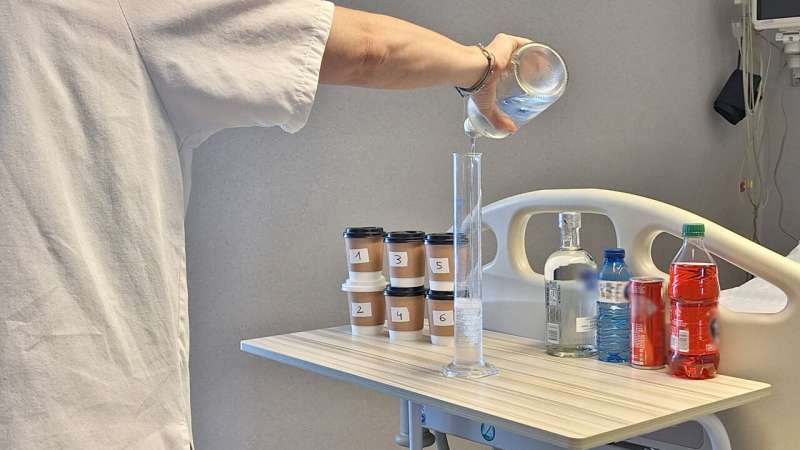A clinical trial led by the Germans Trias i Pujol University Hospital and Research Institute has found that women experience some of the subjective effects of acute alcohol intake, such as drunkenness and sedation, more intensely than men, when consumed over a short period of time.
The study is among the few conducted so far to analyze sex differences in the effects of binge drinking, defined as consuming more than 4 standard units of alcohol (SUA) in two hours for women, and more than 5 for men. This pattern is often associated with social events among young people and should not be underestimated, considering that one SUA contains 10 grams of alcohol, equivalent to half a mixed drink, a small beer, or a small glass of wine.
According to the 2023 EDADES home survey, 9.6% of people aged 15 to 64 (12.9% of men; 6.3% of women) reported at least one binge drinking episode in the previous month. This figure more than doubles among adolescents aged 14 to 18, reaching 24.2% (24.8% in boys; 23.5% in girls).
The aim of the trial was to determine, in general terms, whether women experience the effects of alcohol more intensely than men. But proving this is difficult if, as is often the case, the same amount of alcohol is given to both sexes. Women typically reach higher blood alcohol concentrations due to multiple factors: lower body weight, higher body fat, lower muscle mass, lower levels of alcohol-metabolizing enzymes, and hormonal differences.
In this regard, Clara Pérez Mañá, a researcher with the Clinical Pharmacology of Substance Use Disorder group at the research institute, highlights a key aspect of the study: “We managed to adjust the doses so that the resulting alcohol concentrations were identical for both women and men. From this equal baseline, we observed that the effects were stronger in women, particularly regarding feelings of drunkenness and sedation.”

The false sense of security from consuming energy drinks
The study published in Frontiers in Pharmacology, conducted between 2020 and 2022, involved 28 young adults between the ages of 18 and 25, half of them women. Over several sessions lasting 80 minutes, participants were given alcohol either on its own or mixed with energy drinks, among other conditions.
Specifically, women consumed 55 grams of alcohol (just under three mixed drinks), while men consumed more: 70 grams, or the equivalent of about three and a half mixed drinks. Both groups reached blood alcohol concentrations of 0.46 mg/L, nearly twice the legal limit for expired air tests used to estimate blood alcohol levels in drivers in Spain, which is 0.25 mg/L.
In addition to recording participants’ self-reported levels of drunkenness and sedation at various points, they were also asked to complete performance tests simulating driving ability. The trial did not find that women’s driving performance -measured through reaction time and hand-eye coordination, for example- was worse than men’s, despite reporting stronger subjective effects.
Once it was established that alcohol similarly impaired driving-related skills in both sexes, the study drew a final conclusion: that energy drinks do not counteract the effects of alcohol. Many people consume them with that intention, particularly to offset the sedative effects.
“Mixing energy drinks with alcohol does not improve driving performance; on the contrary, it may create a false sense of control and safety that encourages risky decisions such as driving, engaging in risky sexual behavior, or consuming other substances, as shown by other studies,” Pérez Mañá concludes.
In fact, in this regard, the study builds on one published four years ago, which concluded that mixing energy drinks with alcohol may increase the risk of traffic accidents. That earlier study, which did not differentiate between genders, was led by the Hospital del Mar Research Institute and the Germans Trias i Pujol Research Institute, and was published in the International Journal of Neuropsychopharmacology.
More information:
Olga Hladun et al, No significant gender differences in driving-related skills following alcohol mixed with energy drinks during an experimental binge-drinking episode, Frontiers in Pharmacology (2025). DOI: 10.3389/fphar.2025.1581229
Citation:
Women more susceptible to certain subjective effects of alcohol during binge drinking episodes (2025, July 9)
retrieved 9 July 2025
from https://medicalxpress.com/news/2025-07-women-susceptible-subjective-effects-alcohol.html
This document is subject to copyright. Apart from any fair dealing for the purpose of private study or research, no
part may be reproduced without the written permission. The content is provided for information purposes only.

